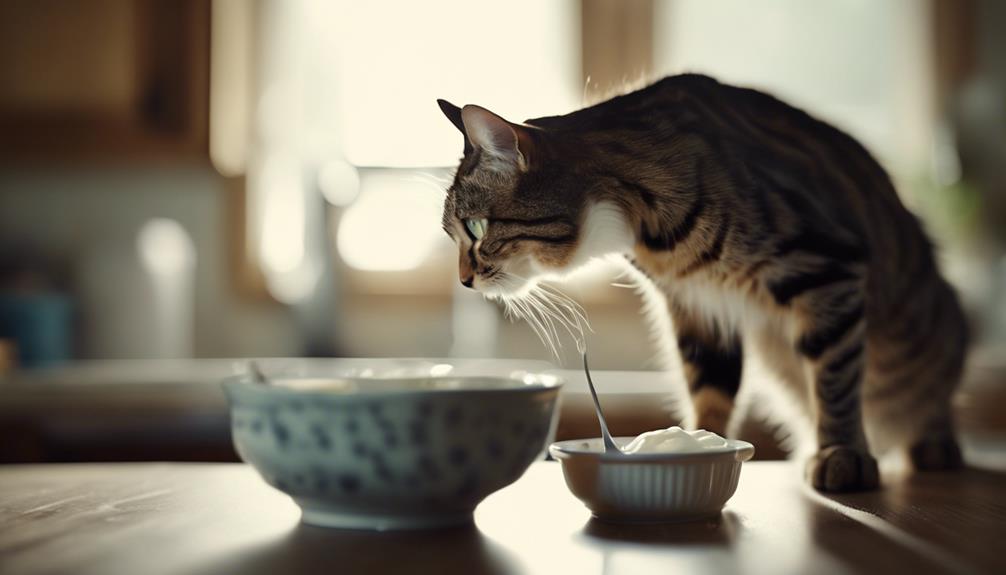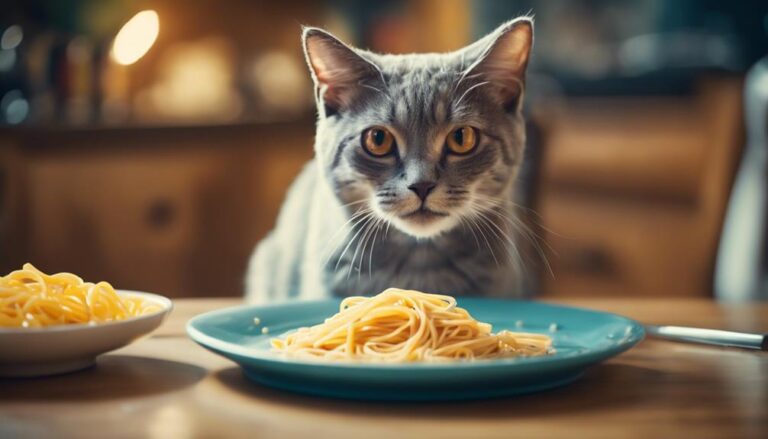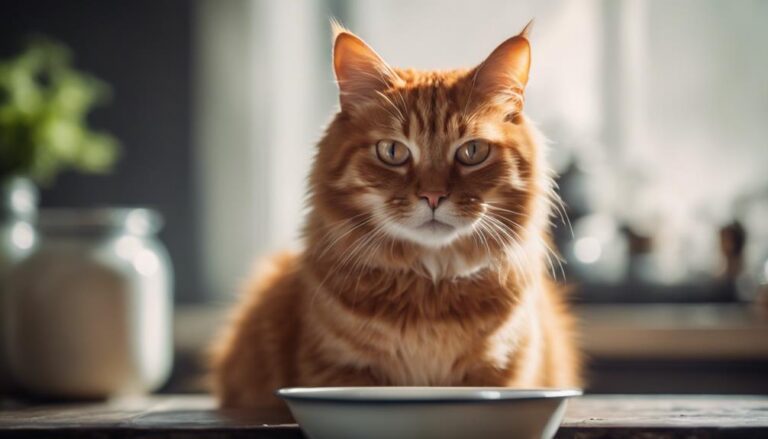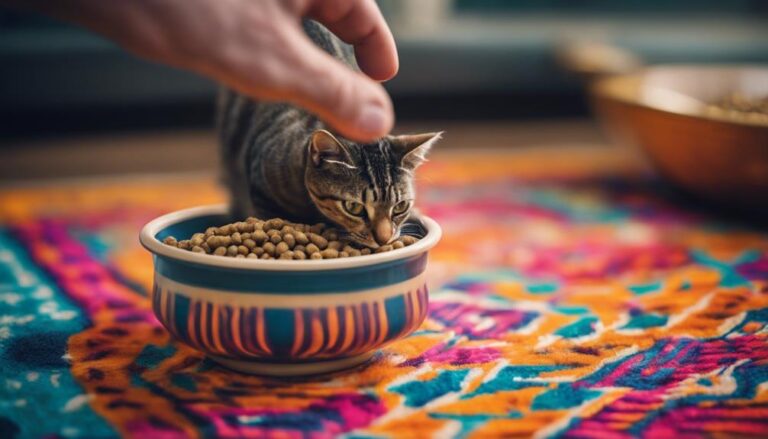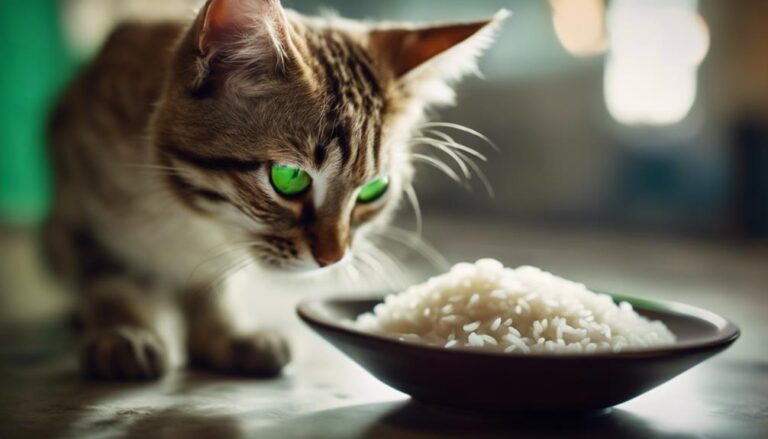If you've ever wondered whether cats can have yogurt, the answer might surprise you. While it's generally considered safe in moderation, there are important factors to consider before offering this treat to your feline friend. From potential sensitivities to the benefits of specific types of yogurt, the discussion around cats and yogurt is more nuanced than you might think. Before you make that decision, there are a few key considerations to keep in mind that could impact your cat's health and happiness.
Yogurt: A Safe Treat for Cats
If your feline friend enjoys the occasional treat, plain and unsweetened yogurt can be a safe option for them. Cats can eat yogurt as it's safe for them, providing a source of high protein along with beneficial live bacteria that can help with their digestion.
The protein, calcium, and essential vitamins present in yogurt can be a nutritious addition to your cat's diet when given in moderation. However, it's essential to remember that yogurt should only be an occasional treat for your cat and not a primary source of nutrition.
Before introducing yogurt to your cat, it's advisable to consult with a vet to ensure that it's suitable for your cat's specific dietary needs. By offering yogurt as an occasional indulgence, you can provide your cat with a tasty treat that also offers some nutritional benefits.
Benefits of Yogurt for Cats
Yogurt offers your feline friend important nutrients like protein, calcium, and vitamins B2 and B12.
The live bacteria in yogurt could assist in your cat's digestion.
Plus, the probiotics in yogurt may help maintain your cat's gut health.
Digestive Health Support
Wondering how yogurt can support your cat's digestive health?
Yogurt contains probiotics that can benefit your cat's digestive system by promoting a healthy gut flora. The live bacteria present in yogurt help with digestion and can assist in alleviating gastrointestinal issues.
Introducing yogurt to your cat's diet in moderation can enhance nutrient absorption and contribute to better digestive health. Monitoring the lactose content in the yogurt is important, as some cats may be lactose intolerant.
Including yogurt as a part of your cat's diet can aid in maintaining overall digestive well-being and balance. Remember, moderation is key when incorporating yogurt to support your cat's digestive system.
Probiotics for Cats
To support your cat's digestive health, consider incorporating probiotics from yogurt into their diet. Probiotics found in yogurt can help maintain a healthy balance of gut bacteria in cats, aiding in reducing intestinal inflammation and alleviating digestive issues. When choosing yogurt for your feline friend, opt for plain, unsweetened varieties to avoid added sugars that can be harmful to cats.
While yogurt provides beneficial probiotics, be mindful of lactose intolerance in some cats. Introduce yogurt gradually and watch for any signs of upset stomach or diarrhea. You can mix a small amount of yogurt with their food or offer it as an occasional treat to reap the benefits of probiotics without overloading on dairy products.
Nutritional Benefits for Felines
Consider incorporating plain, unsweetened yogurt into your cat's diet to provide essential nutrients and support their digestive health. Yogurt is high in protein, calcium, and vitamins B2 and B12, making it a good addition to your feline's diet.
The live bacteria present in yogurt can aid in digestion for cats, while the probiotics it contains can contribute to their gut health. While cats can benefit from the nutrients in yogurt, it's important not to make it a staple in their diet.
Offering yogurt as an occasional treat in moderation can be a healthy addition to their food options. Remember, a balanced diet consisting of foods specifically formulated for cats should always be the primary focus.
Introducing Yogurt to Your Cat
When introducing yogurt to your cat, start by offering plain, unsweetened yogurt. Cats can eat plain yogurt in small servings as an occasional treat.
It's important to avoid feeding your cat flavored yogurts or those with toxic ingredients. Before incorporating yogurt into your cat's diet, consult with your vet to ensure it's safe for your furry friend.
Keep a close eye on your cat after trying yogurt for any signs of stomach upset or allergies. By starting with plain yogurt, you reduce the risk of introducing unnecessary additives or sugars into your cat's diet.
Types of Yogurt Cats Can Have
While plain, unsweetened yogurt is generally safe for cats to consume, Greek yogurt with lower lactose content and higher protein can be a beneficial option for your feline friend. When considering types of yogurt that cats can eat, it's important to stick to plain yogurt to avoid toxic ingredients that may harm your pet. Greek yogurt, known for its higher protein content and lower lactose levels, is a suitable choice for cats, especially those who may be lactose intolerant.
Steer clear of flavored yogurts or those with added sugars, as these can be harmful to your cat's health. Always check the ingredients label before sharing yogurt with your furry companion to ensure it's safe for them to consume. By choosing the right type of yogurt, such as plain or Greek varieties without any toxic additives, you can treat your cat to a tasty and potentially beneficial snack.
Moderation Is Key: Yogurt for Cats
To ensure your cat's well-being, remember that moderation is key when offering yogurt as a treat.
Plain, unsweetened yogurt can provide your cat with essential nutrients such as protein, calcium, and vitamins. These nutrients are beneficial for your feline friend's overall health and well-being. Additionally, the probiotics found in yogurt can help support your cat's digestive system.
If your cat has trouble digesting lactose, Greek yogurt may be a better option due to its lower lactose content. However, it's crucial to consult with your veterinarian before introducing yogurt into your cat's diet.
Your vet can provide guidance on the appropriate amount of yogurt to give your cat and ensure that it's safe for them to consume. By offering yogurt in moderation and seeking professional consultation, you can treat your cat to a tasty snack while also providing them with potential health benefits.
Greek Yogurt for Feline Friends
When considering Greek yogurt for your feline friends, you'll want to know about the health benefits it offers. Greek yogurt can provide your cat's diet with probiotics that promote digestive health and strengthen the immune system. Additionally, it is a good source of protein, calcium, and essential nutrients that can contribute to your cat's overall well-being.
Appropriate serving sizes for cats are crucial when introducing Greek yogurt into their diet. While yogurt can be a healthy treat, moderation is key. A small amount, such as a teaspoon or two, a few times a week, is generally safe for most cats. It's essential to monitor your cat's reaction to yogurt and adjust the serving size accordingly based on their individual tolerance and dietary needs.
It's important to be aware of any potential risks or precautions when offering Greek yogurt to your cat. Some cats may be lactose intolerant, so it's crucial to watch for any signs of digestive upset, such as diarrhea or vomiting, after consuming yogurt. Additionally, flavored or sweetened yogurt should be avoided due to the high sugar content, which can lead to weight gain and other health issues in cats.
Remember that moderation and choosing the right type of Greek yogurt are key for your cat's well-being. Opt for plain, unsweetened Greek yogurt to avoid unnecessary additives and sugars. By introducing Greek yogurt thoughtfully and carefully monitoring your cat's response, you can incorporate this nutritious treat into their diet in a safe and beneficial way.
Health Benefits of Greek Yogurt
Greek yogurt offers feline friends a nutritious boost with its protein, calcium, vitamins B2, B12, and beneficial probiotics. When cats consume Greek yogurt, they benefit from:
- Protein: Essential for muscle growth and repair, helping to keep your cat strong and healthy.
- Calcium: Important for bone health, aiding in maintaining strong teeth and bones.
- Probiotics: Assist in digestion and promote gut health by maintaining a healthy balance of beneficial bacteria in your cat's digestive system.
Feeding your cat plain Greek yogurt without added sugars or artificial ingredients can be a healthy addition to their diet, providing these essential nutrients while being easier on their digestion due to the lower lactose content.
Serving Size for Cats
For cats, the ideal serving size of Greek yogurt as a treat is up to one tablespoon. Greek yogurt contains less lactose than regular yogurt, making it easier for cats, even those who are lactose intolerant, to digest.
When offering Greek yogurt to your feline friend, opt for plain varieties without added sugars or artificial ingredients to prevent any potential digestive upset. It's important to monitor your cat after introducing Greek yogurt into their diet and watch for any signs of discomfort.
Before making Greek yogurt a regular part of your cat's diet, it's advisable to consult your vet to ensure it fits well with their overall nutritional needs and health status.
Risks and Precautions
Monitoring your cat's reaction to Greek yogurt is crucial to identifying any potential stomach upset or digestive issues. When considering feeding your cat Greek yogurt, keep the following in mind:
- Lactose Intolerance: Greek yogurt has less lactose than regular yogurt, which may be better for cats with lactose intolerance, but some cats can still be sensitive.
- Moderation is Key: The higher protein content in Greek yogurt can be beneficial for cats, but it should only be given in moderation as a treat to avoid overloading their system.
- Consult Your Veterinarian: Before adding Greek yogurt to your cat's diet, consult with a veterinarian. They can provide guidance on whether it's safe for your specific feline friend and ensure it complements their overall nutritional needs.
Considerations for Feeding Cats Yogurt
Consider your cat's dietary requirements and digestive sensitivities before incorporating yogurt into their diet as a treat. Plain unsweetened yogurt can be beneficial in small amounts, providing protein, calcium, and vitamins. However, it's crucial to consult a vet beforehand. When giving yogurt to your cat, make sure it follows the 10% rule for cat treats in their daily calorie intake. Additionally, consider cat-specific probiotic supplements to promote better digestive health.
Avoid flavored yogurts that contain sugars or toxic ingredients, including harmful sugar substitutes like xylitol. While yogurt can offer some advantages, remember that a balanced diet of veterinarian-recommended cat food should be the primary source of nutrition for your feline companion. Prioritize your cat's well-being by ensuring that yogurt, or any other treats, are given in moderation and as part of a wholesome diet plan approved by your vet.
Frequently Asked Questions
Is It Safe for Cats to Eat Yogurt?
Yes, it is safe for cats to eat yogurt in small amounts. Live bacteria in yogurt may aid their digestion. Remember, cats don't require yogurt for essential nutrients. Some cats may be intolerant to lactose and have stomach issues. Greek yogurt can be a better option.
What Kind of Yogurt Is Good for Cats?
For your cat, opt for plain, unsweetened yogurt without harmful additives. Greek yogurt, with less lactose and extra protein, is a good choice. Avoid toxic ingredients like xylitol or grapes. Always check labels for safety.
Can Cats Have Greek Vanilla Yogurt?
Greek vanilla yogurt, with higher protein content, can be given to your cat in moderation as a special treat. Avoid varieties with added sugars or artificial sweeteners. Watch for any digestive issues and consult your vet beforehand.
Why Do Cats Like Yogurt so Much?
You like yogurt because of its high protein and fat content, rich taste, creamy texture, tangy flavor, and enticing smell. Eating yogurt might remind you of positive experiences, creating a preference for it due to these factors.

